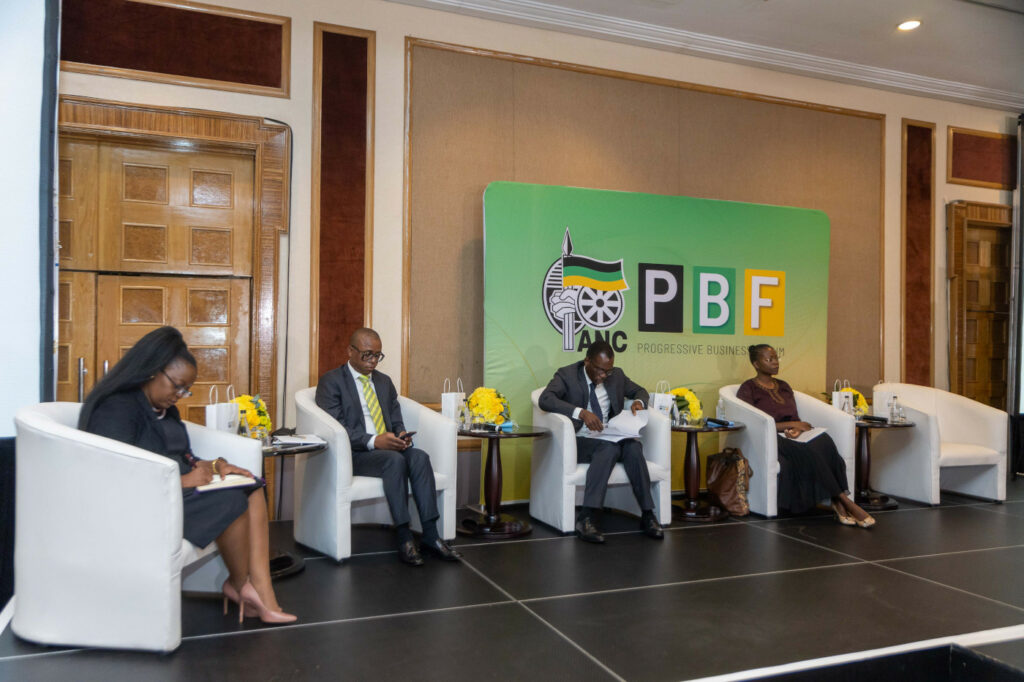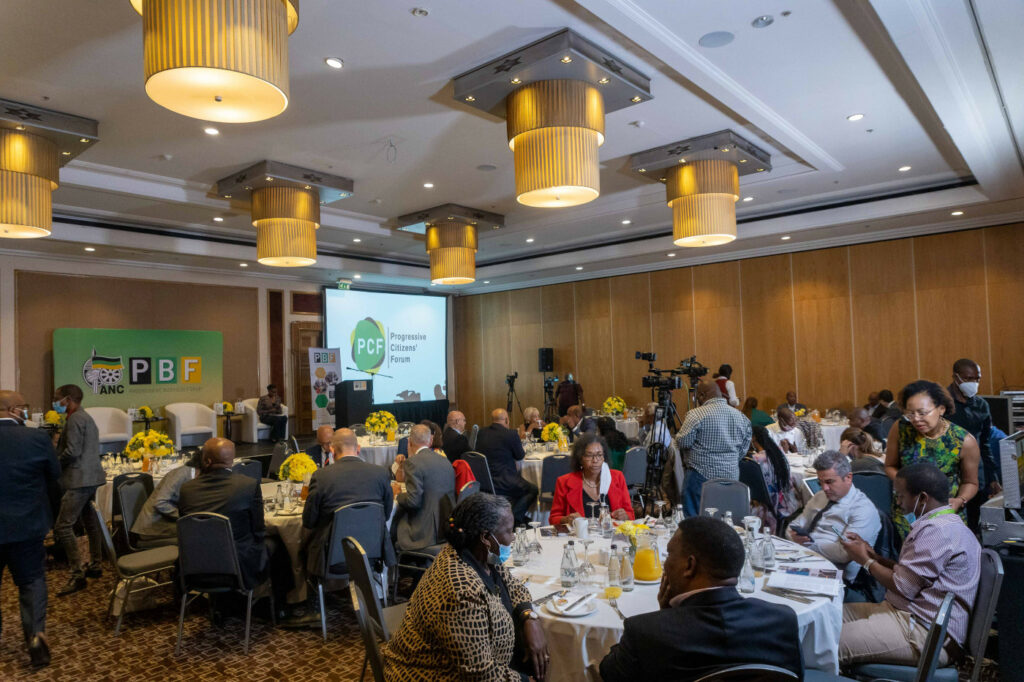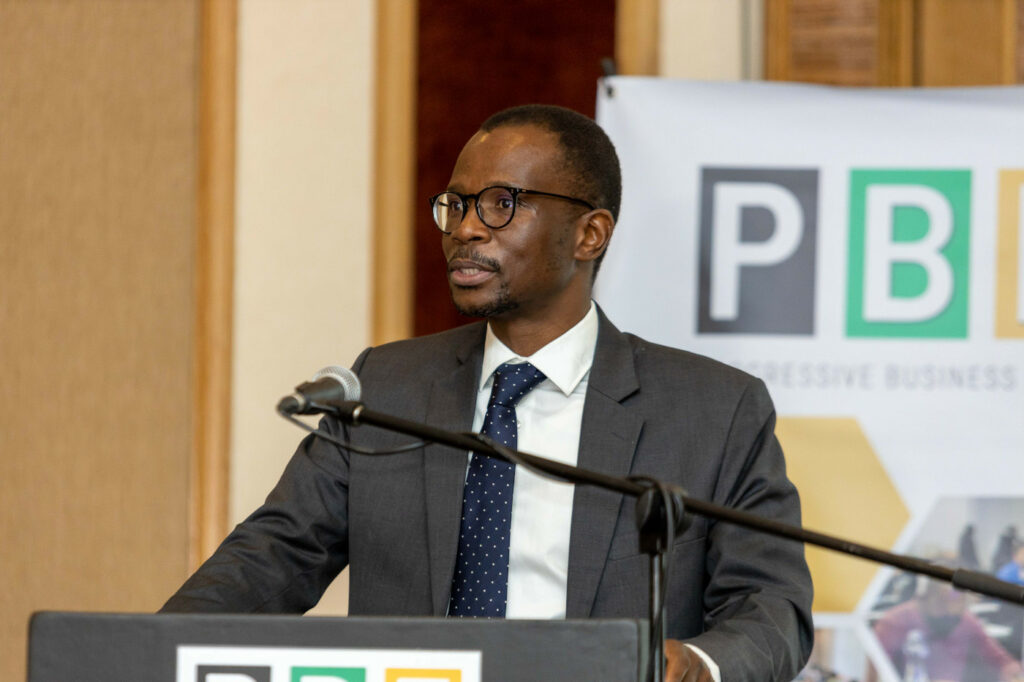Sipho Mbele, Convener of the Progressive Business Forum, addresses the working breakfast at the Hilton Hotel in Sandton
Three reasons to be positive about Budget 2022
Five days after the Budget Vote was delivered in Parliament by Finance Minister Enoch Godongwana, the ANC’s Progressive Business Forum hosted a working breakfast at Sandton’s Hilton Hotel. Deputy Finance Minister David Masondo unpacked the highlights of Budget 2022 by citing three reasons he thought the budget was good. In his own words, this is a summary of what he said:
Reason 1 – More money than expected
We usually do estimation from a revenue side and say, in the next financial year, our estimation for revenue is going to be, for argument’s sake, R1.6-trillion. There’s a lot of work that goes into that thing. We don’t throw bones.
There’s a lot of colleagues in the SARS [South African Revenue Service], SARB [South African Reserve Bank] and National Treasury who work on that.
Their national estimation was less than R182-billion, but because the profit of the mining industry was higher — surprise, surprise — R182-billion was realised. So, that’s great, because at least our revenue is higher [than expected].
This is cyclical. The revenue is not a permanent one, and it’s not due to a structural change in the economy, for example moving from agriculture to industry and changing your GDP composition. It’s not as a result of a structural change; it’s just a temporary outcome. Some analysts say that this commodity boom, it may last longer. I can’t say if they’re right or wrong, but it is what they say.
Reason 2 – There is enough for social grants
We generated more revenue than was expected, [but] it’s still not enough compared to our expenditure needs. We have generated R1.7-trillion, but our expenditure is two-point-something trillion, so there is still a shortfall. But it’s better than what we had estimated as Team Finance.
Because the revenue is higher than what we expected, we can finance among other things the social grants, including the R350 Covid-19 grant.
Reason 3 – No tax increases
Corporate tax is going to be reduced from 28% to 27%, and the economic logic for it is that we really want to set a good environment for the private sector to invest. The private sector constitutes two-thirds of investment in South Africa. That’s why we take business people’s role in investing seriously. Government is doing things to help facilitate the role of the private sector in growing our economy.
There is also a danger that if you continue to increase tax revenue, although revenues will increase, there is a tipping point; a Laffer Curve, developed by supply-side economist [Arthur Laffer]. This says if you keep on increasing the tax rate then it becomes irrational for economic agents to get engaged in economic activity, because all of your revenues will be eaten up by tax.
So we said as part and parcel of trying grow our economy, increase revenue, and even broaden the base (there are conversations about how to treat the digital economy, and how you treat losses in companies that have been used to decrease liabilities), reducing the tax coupled with all these other measures we are going to take, won’t negatively affect our revenue.
But, as we reduce tax, it’s not a given that that tax will be reinvested. It can be redistributed upwards: people engaging in luxurious consumption because they got better dividends, better bonuses, and it doesn’t trickle down insofar as the economy is concerned.
So President Cyril Ramaphosa called for a social compact between government, business and labour. So you have to say, government gives, what is the role of the private sector in increasing the investment? It’s a conversation: government is not going to force you; it’s going to be a dialogue.
We also reduced tax in certain income brackets. We did not increase the fuel levy. This is also an attempt to reduce the cost of living in South Africa. — Carien du Plessis
——————————————————————————————————————————————————————————————–
Five things on government’s money to-do list for the next six months
National Treasury doesn’t have everything figured out. “Don’t ask me about those questions, about those issues,” Deputy Finance Minister David Masondo said. “When you ask me about those questions, the standard answer will be: we are still working on those, bear with us.”
He said while Treasury knew the nature of the problem, they were still working on finding solutions.
 National Treasury is working on South Africa’s problems, among them the thorny and unresolved issue of e-tolls, said Deputy Finance Minister David Masondo
National Treasury is working on South Africa’s problems, among them the thorny and unresolved issue of e-tolls, said Deputy Finance Minister David Masondo
There are at least five issues:
1. The Eskom debt
Debt is a function of the operational efficiencies of a company, Masondo said, and as long as Eskom does not improve its operational efficiencies, it will not get out of its problem. The origin of the problem is also in the cost structure, which is very high, while the revenue is low. There are also cost overruns associated with the build programmes of Medupi and Kusile power stations.
Raising tariffs is going to choke the economy, Masondo said. “Our competitive advantage in South Africa, in the past, even under that apartheid government, we could say that we can give you electricity cheap.”
He said this would convince investors to come to South Africa. “If we don’t sort out the issues of electricity, and Eskom keeps increasing its tariffs, it will be negative.”
2. The e-tolls
Government has no answer on this as yet, and we are working on it, Masondo said.
3. Public sector wage bill
Government cannot afford the inflation-related public wage settlement that was signed three years ago, Masondo said.
Unions have rejected the government’s offer of having a conversation, but the Constitutional Court on Friday ruled in government’s favour on this.
One of National Treasury’s risks has been the public sector wage bill, and there will be more time for unions to talk to government during a summit scheduled for month-end.
“The wages in the public sector are high, so we can’t employ more teachers, police officers, and nurses,” Masondo said.
4. Basic income grant
This has been touted for years now and there are rumours that President Cyril Ramaphosa supports such a grant, but National Treasury still deems it unaffordable.
Masondo said: “We are having conversations within government on what should be the income support for the poor and the unemployed. Our government is very consultative, so please state your views.”
5. Transport logistics
Transnet will now allow third parties to be on our rails, like we have on our roads, Masondo said. “The fact that you have a bus company owned by the state, doesn’t mean that you should not allow Greyhound and others to operate. The same [goes] with rail.”
He said this would encourage competition, because one of the problems for economic growth is logistics, and Transnet’s charges are high. “If you don’t solve your logistics on the supply side of the economy, you’re not going to realise the demand,” he says.
At least one analyst warned that Masondo’s list of unknowns was too long.
Mamokete Lijane, senior sales trader: capital markets and foreign investment at Absa, said: “You can’t have that long list of unknowns.”
She said that Eskom is, to her, not as concerning as the uncertainty around Sanral’s e-tolls. “It makes the fiscal path presented by the minister lack credibility. This is the discomfort I have with the budget.” — Carien du Plessis
——————————————————————————————————————————————————————————————–
Business leaders interact with government’s money leaders
Rudy Rashama from African Union Communications said slow payment by government departments is a problem:
One of the biggest problems we have as black business is that we don’t get support from the banks. You get a tender from government, but the bank doesn’t want to finance it. On the other side, one of the biggest challenges that we have from businesses is non-payment from departments and SOEs. They will pay you in a number of months or pay you whenever they feel like it. There is also a delay by state attorneys when you take them to court, and small businesses can’t afford it. This threatens employment.
 The Progressive Business Forum’s working breakfast provided an opportunity for relevant questions about South Africa’s policies and finances to be asked and answered
The Progressive Business Forum’s working breakfast provided an opportunity for relevant questions about South Africa’s policies and finances to be asked and answered
Trudi Makhaya, Cyril Ramaphosa’s Economic Advisor, replied:
The non-payment of contractors is a long-standing problem and mechanisms have been put in place to deal with it. Sometimes a department raises certain issues that they have with a contracting issue, but to be fair, that should be raised upfront rather than after a long time. This is one of the issues that the red tape reduction should address, because it really is stifling a lot of business development.
What had been intended with the loan guarantee scheme — in relation to banks supporting black businesses — didn’t work out. So in this budget there is a relook into that scheme, and the details will come out. One of the things that have come out is to increase the rate at which government will take risk, the loan guarantee scheme, but also to make it easier for businesses to access this, loosening some of the requirements on collateral.
On the state attorneys, it’s not an issue that is close to me, but just last week the president convened the state litigation forum where the state’s approach to legal action was discussed.
Kile Mteto, deputy president of the Black Business Council in the built environment, asks how long tenders will be put on hold:
The latest developments in the Constitutional Court, the memo that was written by the DG of National Treasury, was that public tenders would be placed on hold. How long will that be, and what are the mitigations in place to ensure that service delivery is not affected, especially in municipalities that are ruling in coalitions? Government is the biggest buyer of services and the biggest employer, so what does this move mean for the transformation agenda?
Makhaya responded:
It hasn’t been decided, but I don’t think it threatens the transformation agenda. There is already an immediate commitment for government to look at how we can fulfill the transformation agenda, but [to] do it in a way that meets the requirements of the public procurement framework that we have. The judgment doesn’t question the aim of transformation, but rather how it has been implemented and how the regulations came about. We are updating the Preferential Procurement Bill. Some of the criticism will be incorporated into an enhanced version of the bill.
Dr Gil Mahlati, CEO of Tip One, thinks it’s time for new, friendlier institutions:
One of the reasons why these loan guarantee schemes don’t work with banks, is because they are defined for the first world economy. If I were a taxi driver or taxi owner I could never get a loan from the bank, because first of all I cannot talk English. Why don’t we create institutions that are friendly to us? We can come with all the legislation in the world about transformation and preferential procurement, but we have to create institutions that are friendly to us, and this is a question for the Presidency.
Makhaya answered:
It’s been an ongoing struggle to do this, and the president was on it day and night in the past few years in terms of trying to create something that speaks to new entrants in the market, and also smaller enterprises — those that don’t have the same 100-year-old history, which they would have been prevented from having. The challenge is looking at where the money comes from for that. If an institution has to raise bonds, they will have to be sure that they can repay their financing, so they have to switch on the same risk criteria to ensure that they can pay back their financiers.
It’s not an easy thing to solve. There has been [a lot of] thinking about how to make the loan guarantee scheme more accessible. The criticism has been made, and has been taken, that many people who work in these institutions are not business owners themselves, and don’t understand the criticism that they are facing. There has got to be a rethinking, starting even from how we staff these institutions under control of the state.
Hilton Klein, chairman of the Numolux Group, wants better partnerships with government:
What can we do as the private sector to support government? Numolux Group is in the business of creating jobs and building the economy. We’ve created over 285 jobs after Covid-19 in the private sector, especially in health. We are about to commission a vaccine manufacturing plant in the Saldanha IDZ and that will create almost 2 000 jobs. We are also assisting in the rebuilding of the economy through South Africa’s reconstruction and recovery plan. But we need to know how. We received an extensive amount from our partners in the Far East. We want to know how we can come alongside government, not asking for money from government, but asking how can we as the private sector support government to create those jobs for the youth, to build the economy of our people, and to better the lives of our people. We’ve requested meetings with government departments, but they’re just too busy.
Makhaya responded:
It is good to hear about the vaccine plant. We can’t be consumers of vaccinations, for Covid-19 in particular, and we need to develop platforms that give us some security of supply when it comes to something as critical as pharmaceuticals. We would be happy to talk to you. We are sorry that you’ve had problems. — Carien du Plessis
——————————————————————————————————————————————————————————————–
National debt: the problem with roads that cost R12-million per kilometre
 David Masondo, Deputy Finance Minister
David Masondo, Deputy Finance Minister Once, government paid for a road that cost R12-million for one kilometre to be built, Deputy Finance Minister David Masondo said. It has also “built” a road in a vast, sparsely populated province, but there is now no sign of it. The contractor blamed climate change, saying the rains washed the road away.
Government is borrowing trillions of rands to fund corruption, Masondo said.
“Borrowing in itself is not bad,” he said, “but we are spending money without any service delivery impact.”
South Africa currently owes R4-trillion, and pays R300-billion a year to service this debt.
Trudi Makhaya, economic adviser to President Cyril Ramaphosa, said although it was good news that South Africa was able to increase social grants without worsening the fiscal matrix, economic growth was still not fast enough to sustain the country’s interest burden.
Mamokete Lijane, senior sales trader: capital markets and foreign investment at Absa, agreed that debt is a problem. “Debt remains unsustainably high. The focus for next year remains at 6.6%, and this figure of debt to GDP is still a shock number. We need the deficit to come down [faster than it has done].” — Carien du Plessis
Will the conflict in Ukraine be a spanner in the budget works?
Russia announced its “military exercises” in Ukraine on 24 February, a day after Finance Minister Enoch Godongwana delivered the 2022 Budget Vote — an event that changed the economic outlook not only for South Africa, but also for the world.
Russia is a big exporter of oil, and due to a projected shortage, the fuel price rose in a matter of days.
Mamokete Lijane, senior sales trader: capital markets and foreign investment at Absa, said while the global commodities boom offered an opportunity, there are also constraints, which include acceptable debt levels, and big global events such as the Ukrainian conflict.
“You have oil prices going higher and higher, and the potential inflationary impacts of that, [and there is the issue of] access to markets, and financial conditions,” she said.
“We still don’t know how it will play out, but if you look at what happened on Friday with equity prices, things could really get tough before they get better.”
When asked to be more specific, she said it all depends on how long the conflict lasts. “It depends on how Russia chooses to respond to the sanctions. It depends also on how acrimonious the Russian-European story turns out to be. If you end up with a problem, with Russia choosing to stop exporting fuel to Europe, that will have a profound impact. Your fuel prices will rise, and global growth will slow, and you could be in a crisis that lasts for five years. Who knows? It really depends on how this plays out, so I think you’d better pray that sanity will prevail in the next few months.”
Lijane said: “If the conflict prevails and deepens, it will be much more difficult to come back from, and you will have a much more difficult time for the local economies than would have been the case if it were short.” — Carien du Plessis